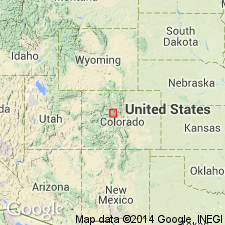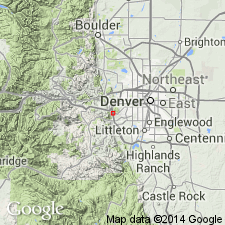
- Usage in publication:
-
- Battle Mountain formation
- Modifications:
-
- Principal reference
- Dominant lithology:
-
- Sandstone
- Limestone
- Dolomite
- Shale
- AAPG geologic province:
-
- Eagle basin
Summary:
Pg. 1376 (fig. 1), 1378 (fig. 2), 1379-1385. Battle Mountain formation. Proposed for sequence of lower Pennsylvanian rocks which lies unconformably on Mississippian and older rocks and which is disconformably overlain by State Bridge formation. Composed chiefly of grits and sandstones with thick beds of shale and conglomerate; occasional beds of limestone and dolomite which range from a few inches to 30 feet in thickness. About 4,300 feet thick in north part of area; more than 7,900 feet farther south; nearly 1,600 feet are porphyry sills of Cenozoic age. In early reports, sequence of sediments here assigned to Battle Mountain was divided into six formations on basis of lithology or color; these were (ascending) Weber formation, Robinson limestone, White Quail limestone, Maroon formation, Jacque Mountain limestone, and Wyoming formation. As here defined Battle Mountain includes (ascending) Belden shale (new), Robinson limestone, and Jacque Mountain limestone members. Report covers Gore area, Eagle and Summit Counties, northwestern Colorado. Age is [Middle] Pennsylvanian (Des Moines).
Type section: north side Turkey Creek; section begins on top of Hill 11610 (Minturn quadrangle) west of Dagett Pass (Shrine Pass Road) about 6 mi east of Red Cliff, Eagle Co., northwestern CO. Named from Battle Mountain 3.5 mi northeast of Red Cliff, [in T. 6 S., R. 80 W., Eagle Co., northwestern CO].
Source: US geologic names lexicon (USGS Bull. 1200, p. 239-240).

- Usage in publication:
-
- Battle Mountain formation
- Modifications:
-
- Not used
Summary:
[Battle Mountain formation not used (abandoned). Replaced with Maroon formation. Belden shale member raised to formation rank; underlies the Maroon. See entries under Belden and Maroon.]
Source: GNC index card files (USGS-Menlo; USGS-Reston); GNU records (USGS DDS-6; Denver GNULEX); USGS Prof. Paper 956 (Tweto and Lovering, 1977, p. 34).
For more information, please contact Nancy Stamm, Geologic Names Committee Secretary.
Asterisk (*) indicates published by U.S. Geological Survey authors.
"No current usage" (†) implies that a name has been abandoned or has fallen into disuse. Former usage and, if known, replacement name given in parentheses ( ).
Slash (/) indicates name conflicts with nomenclatural guidelines (CSN, 1933; ACSN, 1961, 1970; NACSN, 1983, 2005, 2021). May be explained within brackets ([ ]).

